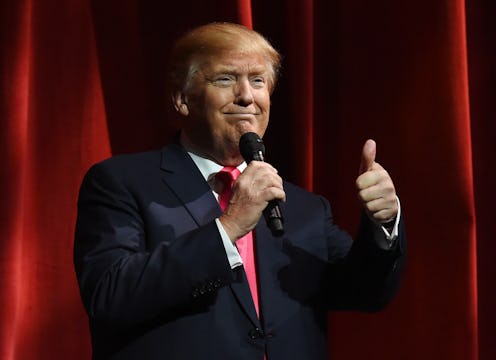Up until January — the month preceding the Feb. 1 Iowa caucuses — Donald Trump refused to put out televised or online campaign ads. Now, as the primary election season approaches, Trump has released a series of them in rapid fire style. To complement his three television ads, each of which were released in January, Trump has added a new Internet ad to his YouTube series.
Over the past week, he has published seven short videos featuring him sitting at his desk making a direct address to America. Each is titled according to the subject topic at hand. They include "Illegal Immigration," "The Economy," "Life Changing Experience," "Unifying the Nation," "Jobs," "Military," and as of late, "The Establishment." And according to Trump, the establishment (and everyone else) is out to get him.
The establishment, the media, the special interests, the lobbyists, the donors — they're all against me.
I'm self-funding my campaign. I don't owe anybody anything. I only owe it to the American people to do a great job.
They are really trying to stop me. Everybody knows it, everybody sees it. We're going to win. We're going to win it for the people. We're going to win it for our country. We're going to make America great again.
The very thing that Trump is advertising — his rejection of "establishment" politics — is the secret ingredient to his popularity thus far. He's a billionaire who doesn't need funding from anyone. Since he doesn't need money (and we all know money drives politics), he doesn't need to cater to anyone but himself. His straightforwardness and atrocious lack of concern for his controversial statements has redefined what it means to be a politician today. And luckily for him, voters seem to like the new "honest" face of the Republican party. If he's admitting that he's discriminatory, I guess he's being honest, right?
By speaking his mind, keeping it simple, and resisting political correctness, Trump is rejecting the showmanship of American politics. For example, Americans perceive politicians as the epitome of dishonesty. According to a Pew Research study published in November 2015, only about 19 percent of Americans trust the government "always or most of the time." Even more telling, 74 percent of Americans believe that politicians operate based on their own special interests, shoving those of the public aside to deal with later. The Atlantic's Conor Friedersdorf interviewed a group of anonymous Trump supporters and helped shed light on how Trump's "anti-establishment" identity has won over voters. One man explained his reasoning by illustrating how sick people are of establishment politics in general. In other words, Trump is like the anti-politician, the alternative to the stale status quo, saying:
Many are right; it's not about trusting Trump; it's a collective middle finger to the establishment... Trump isn't stupid, he gets it. He knows the more outrageous, the better.
Another individual echoed the yearning for an alternative to the norm.
The preeminence of political correctness among the culture class indicates a momentous shift away from formerly prominent middle-class cultural values towards something entirely different. Even if Donald Trump were to accomplish little in his presidency, there is a hope that were he president, he could in some way alter that prevailing Washington/media culture, and set a new cultural tone.
For this reason, Trump actually benefits by creating non-traditional ads that are short and sweet. It sets him further apart from politicians who elaborately cater to special interests in their campaigns. Interestingly enough in the context of the advertisement industry, he appeals to neither emotion nor logic in his online ads. Instead, it's all about the ethos. He reiterates his character, his authority as a candidate. He portrays himself as an outsider who's up against all of the odds for an important reason. In fact, he's pulling off a pretty big stunt by making himself — a billionaire — relatable to the common citizen who's had to face the odds in some way or another.
Trump waited a long time to advertise this quality. In contrast to him, Jeb Bush and his Right to Rise Super PAC, for example, had already spent over $49 million in ads by Jan. 9, 2016, according to NBC News. There are two possible reasons why the controversial billionaire waited so long to hop on the campaign ad train. Firstly, the media was already doing the job for him. According to the 2016 Campaign Television Tracker, Trump accounts for 41 percent of Republican candidate mentions. Any additional publicity, especially in the form of ads that are forced upon a TV audience, would have been overkill at the time. Secondly, the ads were conveniently released shortly after the Trump campaign gained access to the Republican National Committee's voter database information. Upon analyzing the data, it's possible Trump decided it was necessary to release ads in order to maintain his constituency. NPR's Scott Detrow explained how Trump's strategy has changed over the past few months:
You really need to start getting organized as the actual elections come up. You need to make sure you've identified your supporters, and you're getting them to the polls and that they're willing to, you know, drive from their house to a caucus site on a weeknight and sit there for one or two hours to make sure they vote for you. So that means more traditional on-the-ground organizing and also more advertising.
Trump has indeed put out more advertisements, but their success is questionable. On YouTube, his latest online ad "The Establishment" has gained less than 10,000 views and his oldest, which was released a week ago, has gained around 30,000 views. In comparison to the millions of voters that must be reached, television may be his better bet.
